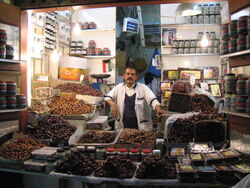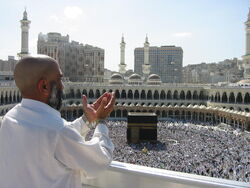The Five Pillars of Islam (Arabic: أركان الإسلام) is the term given to the five duties incumbent on every Muslim. These duties are Shahadah (profession of faith), Salat (ritual prayer), Zakat (almsgiving), Siyam (fasting during Ramadan) and Hajj (pilgrimage to Mecca). These five practices are essential to Sunni Islam. Shi'a Muslims subscribe to eight ritual practices which substantially overlap with the Five Pillars. Twelvers have five fundamental beliefs which relates to Aqidah.
The concept of five pillars is taken from the Hadith collections, notably those of Sahih Al-Bukhari and Sahih Muslim. The Qur'an does not speak of five pillars, although one can find in it scattered references to their associated practices. Wudu is a washing in salah and it is the first thing they do for Salah.
The Five Pillars to Becoming a Practicing Muslim[]
Shahadah[]
Shahadah is professing oneness of Allah and accepting Prophet Muhammad as his messenger to humanity. And saying: I testify that there is only one god Allah and that Muhammad (PBUH) is his final messenger: but you must say that in Arabic.
"There is no god but Allah, and Muhammad is his prophet" "lā ilāha illā-llāh, muḥammad rasūlu-llāh"
Salat[]
Salat is compulsory but some flexibility in the specifics is allowed depending on the circumstances. For example, in the case of sickness or a lack of space, a worshipper can offer salat while sitting, or even lying down, appropriate number of units (raka'ah). While the prayers may be made at any point within the waqt, it is considered best to begin them as soon as possible after the call to prayer is heard.
The prayers are essentially expressions of adoration of God, but the worshipper may add his own personal request. The most commonly repeated prayer is the short first Sura, or Section of the Qu'ran, beginning, 'Praise be to Allah, Lord of Creation, the compassionate, the merciful'.
Zakaat[]
Zakaat or alms-giving, is the practice of charitable giving by Muslims based on accumulated wealth, and is obligatory for all who are able to do so. Usually it is 2.5% of the persons annual income.
There are four principles that should be followed when giving the Zakat: 1. The giver must declare to God his intention to give the Zakat. 2. The Zakat must be paid on the day that it is due. If one fails to pay the Zakat, people think he is refusing to fulfill God's wishes. 3. Payment must be in kind. This means if one has a lot of money then he needs to pay 2.5% of his income. If he does not have much money, he needs to pay in a different way. For example, if he has a lot of cattle, then he pays in cattle instead of money. 4. The Zakat must be distributed in the community in which it was taken from.
Sawm (during month of Ramadan)[]

Many Muslims traditionally break their fasts in Ramadan with dates (like those offered by this date seller in Kuwait City), as was the recorded practice (Sunnah) of Muhammad.
Three types of fasting (Sawm) are recognized by the Qur'an: Ritual fasting, fasting as compensation or repentance, and ascetic fasting.
Ritual fasting is an obligatory act during the month of Ramadan Muslims must abstain from food, drink, and sexual intercourse from dawn to dusk during this month, and are to be especially mindful of other sins. During Ramadan, Muslims are also expected to put more effort into following the teachings of Islam by refraining from violence, anger, envy, greed, lust, harsh language, gossip and to try to get along with each other better than normal. In addition, all obscene and irreligious sights and sounds are to be avoided.
Fasting during Ramadan is not obligatory, and even forbidden in some cases, for several groups for whom it would be dangerous or excessively problematic. These include pre-pubescent children, those with a medical condition such as Diabetes, elderly people, and pregnant or Breastfeeding women. Observing fasts is not permitted for menstruating women. Other individuals for whom it is considered acceptable not to fast are those who are ill or travelling. Missing fasts usually must be made up soon afterwards, although the exact requirements vary according to circumstance.
Many Muslims break their fast with a dates because it is claimed Muhammed broke his fast with a date.
Hajj[]

The hajj to the Kaaba, in Mecca, is an important practice in Islam.
The Hajj is a pilgrimage that occurs during the Islamic month of Dhu al-Hijjah to the holy city of Mecca, and derives from an ancient Arab practice. Every Able-bodied Muslim is obliged to make the pilgrimage to Mecca at least once in their lifetime if they cfford it. When the pilgrim is around ten kilometers from Mecca, he must dress in Ihram clothing, which consists of two white sheets. Both men and women are required to make the pilgrimage to Mecca, as the Hajj is mandatory for both males and females. After a Muslim makes the trip to Mecca, he/she is known as a hajj/hajja( one who made the pilgrimage to Mecca). The main rituals of the Hajj include walking seven times around the Kaaba, touching the Black Stone, traveling seven times between Mount Safa and Mount Safa, and symbolically stoning the Devil in Mina.
Shi'a Ismaili Seven Pillars of Islam, including the Nizari, Druze, and Mustaali have three doctrines that are not included in the Sunni Five Pillars of Islam: Walayah, Taharah and Jihad. This would raise the total to eight, but the Bohra Ismailis do not include Shahadah, lowering it to seven. The Shahadah is a prominent part of other Ismaili traditions, with the added inclusion of " Alīyun Ameerul Mo'min wali Allah (علي ولي الله("Ali, the Master of Believers, is the representative of God")", at the end of the standard shahadah as recited by the rest of the Muslim Ummah.
See also[]
- Six articles of belief
- Sixth Pillar of Islam
- Shi'a Ismaili Seven Pillars of Islam
- Druze Seven Pillars of Islam
- Modern Islamic philosophy
- Allah
- Names of God
- 99 Names of God in the Qur'an
- Tawhid
- Termagant
- Islamic month
- Qaaba
- Holy Prophet Muhammad
External links[]
- Pillars of Islam. A brief description of the Five Pillars of Islam.
- Audio version of the Quran
- Understanding the five pillars of Islam with pictures.
